Welcome back to This Week in Apps, the Extra Crunch series that recaps the latest OS news, the applications they support and the money that flows through it all.
The app industry is as hot as ever with a record 203 billion downloads in 2019 and $119 billion in consumer spending, according to preliminary year-end data by App Annie. People spend 90% of their mobile time in apps and more time using their mobile devices than watching TV. Apps aren’t just a way to waste idle hours — they’re big business, one that often seems to change overnight.
In this Extra Crunch series, we help you to keep up with the latest news from the world of apps, delivered on a weekly basis.
This week, we’re back to look at the latest headlines from the app world, including Apple’s record holiday 2019 on the App Store, a look at the staying power of AR hit, Pokémon Go, how the app stores handled a UAE spying tool, stalled Instagram growth in the U.S., and more.
Headlines
App Store has a record holiday
Apple this week highlighted new holiday 2019 records set on the App Store, which sees over a half a billion visits from people in 155 countries per week. To date, App Store developers have earned over $155 billion, Apple noted. What’s most remarkable is that a quarter of those earnings came in last year alone. Apple also noted it saw a busy holiday season on the App Store, with customer spending reaching $1.42 billion between Christmas Eve and New Year’s Eve — a 16% increase over 2018.
On New Year’s Day, customers spent $386 million alone — a 20% increase over 2019 and a new single-day record.
Apple confirms 2019’s top apps
In addition to the record year, Apple also confirmed the year’s top 10 free and paid apps and games, with YouTube (free), Facetune (paid), Mario Kart Tour (free game) and Minecraft (paid game) snagging the No. 1 position in their respective categories.
You can read the full list here on TechCrunch.
Pokémon Go’s staying power revealed
It may have seemed like the enthusiasm for AR app Pokémon Go had slowed down, but Sensor Tower data indicates the app is doing better than ever — at least in terms of user spending. The game had its best-ever year in 2019, reaching nearly $900 million in player spending, the report said. This is even better than its launch year, when it grossed $832 million in user spending. The growth is attributed to significant updates to the app and real-world events. Much of the app’s revenue comes from the U.S. where it grabbed $335 million — or 38% of all user spending. Japan and Germany follow, with 32% and 6%, or $286 million and $54 million, respectively.
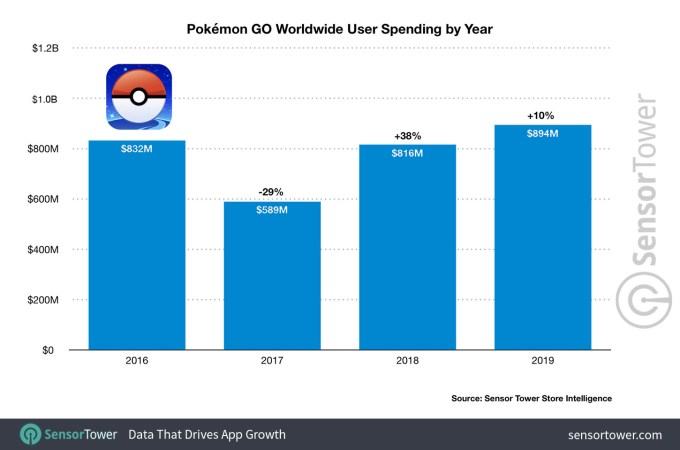
Chat app ToTok booted from app stores for being a UAE government spy tool…
Controversy emerged just ahead of the holidays over a popular chat app, one of the most downloaded even in the U.S., which was revealed to be a spy tool used by the United Arab Emirates. The app was found to be sending highly sensitive data to the UAE, according to The NYT. U.S. intelligence officials already knew, having been warned not to use it. The app was booted from Google Play and the App Store after the report ran. ToTok (not to be confused with short-form video app TikTok) had millions of downloads in North America, the Middle East, Europe, Asia, and Africa.
…and was allowed back in?
Later, Google allowed the app back in after an update, which requires users to authorize its ability to access and sync your contact list, according to an in-app prompt. It’s interesting, however, that Apple didn’t immediately do the same — perhaps it just doesn’t want known spy tools in its store? Both letting the app back and refusing to do so would set a precedent for Apple — one where Apple would have to vet all apps for government connections or another where it has to greenlight government spy tools. At least Apple had the holidays to think it over.
TikTok parent considers its options, including a sale
TikTok — yes, the video app, not the above-mentioned spying app — is considering how to move forward, in light of increased U.S. scrutiny, which includes an investigation to determine if the app represents a security risk because of its China ties. The parent company, Beijing-based ByteDance, is now reportedly considering what to do in order to protect the value of the business, Bloomberg reported. This includes selling a majority stake to investors or hiring an aggressive legal defense, among other options. The app is one of the largest in the world, but questions have been raised about its need to censor topics as the Chinese government demands, plus the risk involved with TikTok’s control of U.S. user data.
In related news, ByteDance released its first TikTok transparency report. It claims the company received no requests for user information from China in the first half of 2019. How convenient!
TikTok’s Chinese counterpart Douyin hits 400M DAUs
Meanwhile, the Chinese version of TikTok, Douyin, is bigger than ever, a year-end report from ByteDance says. This version of the app grew from 250 million active daily users in January 2019 to now 400 million active daily users. In a related report from eMarketer, Douyin’s growth tops that of both WeChat and Weibo and now makes up 67.9% of China’s social network users and 59% of smartphone users.
Questions on Catalyst
The subject of using Catalyst to bring iOS apps to the Mac has been making news as of late, with many in the developer community expressing criticism over technology. As Jack Wellborn explained on his site (flagged by Daring Fireball), the idea of porting iOS apps to Mac with minimal effort seems absurd due to the platform differences.
John Gruber then goes on to point out that almost all the Catalyst apps look and feel wrong, including one of the most high-profile examples: Twitter. The app has been improving with recent updates, but Gruber opines that the problem is that Catalyst itself isn’t a full-fledged framework for building proper Mac apps yet. Twitter didn’t even support scrolling with Page Up/Down, Home and End initially. The question now, however, is whether or not Catalyst can ever get there — especially when so many iOS apps aren’t using standard UIKit controls to begin with.
Consumer Spending hit record $83.5 billion worldwide
Sensor Tower’s year-end report estimates that users spend $83.5 billion globally in apps and games in 2019, which is 17% higher than the $71.3 billion reached in 2018. Apple’s portion was a record $54.2 billion, up 16% year-over-year. That figure is also notably 85% bigger than the $29.3 billion achieved by Google Play. Note that this report only looks at the App Store and Google Play — App Annie’s “State of Mobile,” due out next week, will update figures to include third-party app stores.
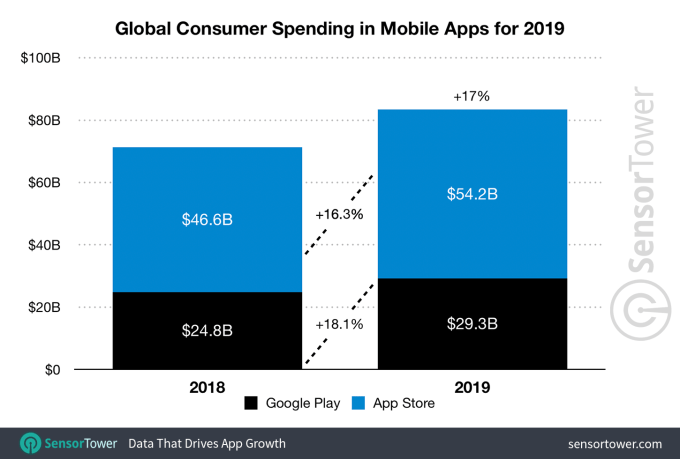
Instagram user growth stalls
According to a report from eMarketer, Instagram’s U.S. user growth will have dropped to single digits (6.7%) for the first time. Last year, growth was 10.1% in 2018. The firm also said the app will grow slower than previously expected, dropping to 1.8% user growth by 2023, None of this is to say Instagram is doing poorly, necessarily — it’s still a top social platform in the U.S. — it’s just nearing saturation. Plus, apps like TikTok and Snapchat are making it harder to achieve high growth.
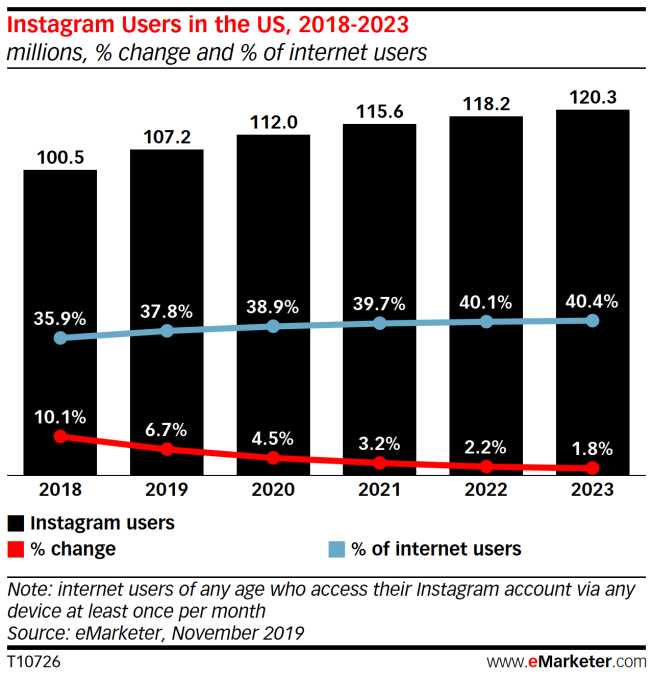
Report: Mobile accounts for 60% of video game revenues worldwide
According to BusinessofApps.com, citing research from GoldenCasinoNews.com, mobile games accounted for around 60% of video game revenues in 2019. That’s $49 billion, followed by online games at $16.9 billion. Download games came in at $15.1 billion.
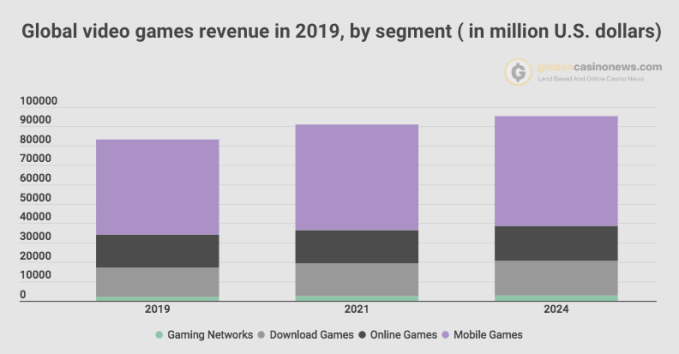
Facebook mobile gaming revenue up 359%
Apptopia reports Facebook has generated $21 million through in-app purchases since it launched IAP in April 2018. December is the highest-grossing month, with $2.8 million in purchases.
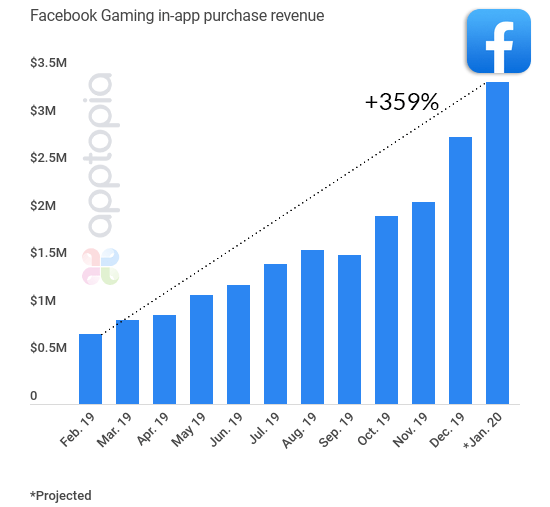
Peloton’s very bad holiday
The Peloton holiday ad was bad. As in a total bomb. It was called sexist and dystopian. And it even caused the stock to drop. (It’s still unclear why the brand thought a man giving a very thin, nervous, and pained woman an exercise bike as her big holiday gift was a good idea.) But Peloton’s troubles don’t end there. New installs of the app actually declined on Christmas and the day after, Apptopia also found. That’s unusual given that the days after Christmas are usually big days for downloads — bigger than Christmas Day, in fact.
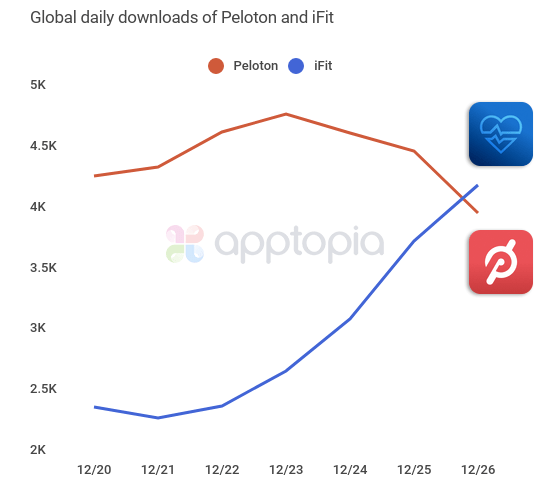
More Reading:
Want to know the story of how and why Marc Benioff gifted the AppStore.com domain to Steve Jobs? Check this out.
Downloads:
David’s Disposable
If you’re wondering why a somewhat gimmicky photo app, David’s Disposable, hit the top of the App Store’s charts, it’s because of David. The app comes from YouTube star David Dobrik who as more than 15 million subscribers. He tapped into that fan base to launch his new app, inspired by his Instagram account where he publishes photos taken with a disposable camera to give them a retro feel. Similarly, the app tries to simulate the disposable camera experience not only by the look and feel of the resulting pics, but also the process of using the app. The photos you snap take a day to “develop,” and can only be retrieved at 9 AM the next day. You can also order prints at $1 per photo. Sensor Tower says the app has topped a million downloads in under a month.
 Tweet of the Week:
Tweet of the Week: